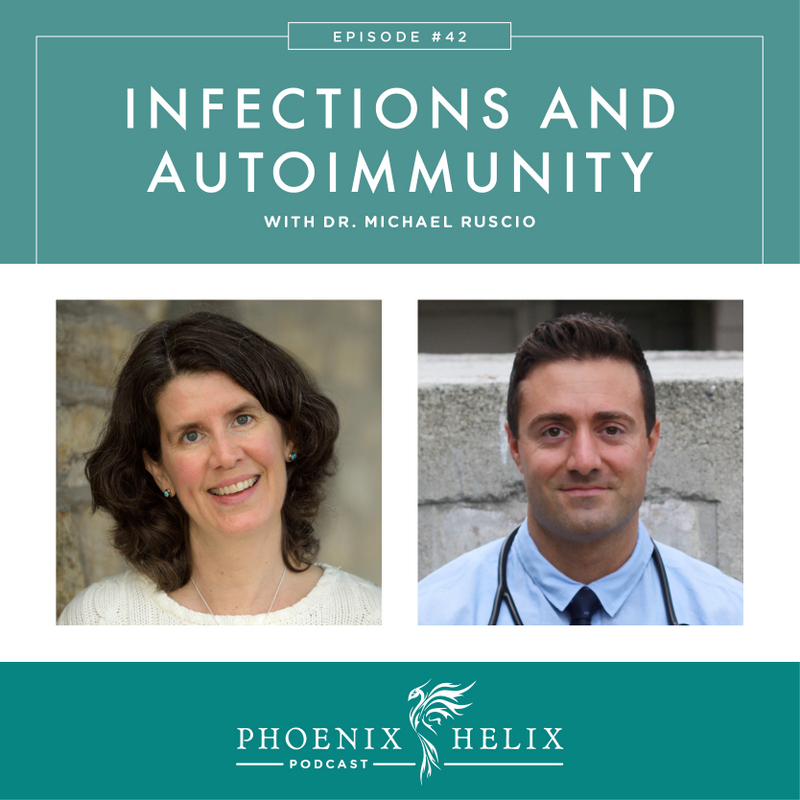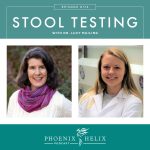Infections as Roadblocks to Healing
If you have been doing the paleo autoimmune protocol for at least a few months and are NOT seeing results, the first questions I would ask you are whether you are focusing on lifestyle in addition to diet – Are you getting enough sleep? Are you managing your stress? And when it comes to food, are you committed 100% to the protocol without cheats, and are you making nutrient dense food choices as well?
If you answered yes to all of those questions and you are doing the protocol to the best of your ability yet it doesn’t seem to be working for you, then it’s time to troubleshoot further, and infections can be obstacles to autoimmune healing. So, that’s the topic of our show today. We’ll be talking about which infections are common, which are rare, and how they are each tested and treated.
Dr. Michael Ruscio is a well-respected practitioner in the paleo community. He is a clinician, educator and researcher, specializing in autoimmune disease and digestive health.
Listen to the Show
- Subscribe to my podcast through your favorite podcast app: iTunes, Stitcher, Google, TuneIn, Spotify, Amazon, etc.
- You can also listen to the episode right here through the player below, and if you subscribe to my newsletter you’ll get notified of future episodes.
Podcast: Play in new window | Download
Show Notes
- Intro (0:00)
- Thank You to our Podcast Sponsor – Paleo on the Go (2:20)
- A frozen meal delivery service, they have a large menu of items for the paleo autoimmune protocol (AIP).
- Use the code PHOENIX for 10% off your first order.
- Meet Dr. Michael Ruscio (3:19)
- Trained as a chiropractor, he now specializes in functional medicine and works with people around the world via Skype. His specialties are autoimmune disease and digestive health.
- His own healing story involves overcoming a parasite infection. When he was in college, his diet and exercise were dialed in, but he started having insomnia, fatigue, brain fog and depression. His conventional doctors could find nothing wrong. He then went to see Dr. Dan Kalish, a functional medicine practitioner, who diagnosed and treated him for a parasite infection – amoeba hystolitica. It took two rounds of treatment to clear the infection. His symptoms started improving immediately but it took a full year before they disappeared altogether. Interestingly, he had no digestive symptoms – instead his parasite infection mimicked hypothyroidism and adrenal fatigue. Dr. Ruscio sees this frequently in his professional practice as well.
- What Are Some Common Symptoms of Gut Infections (11:50)
- Because the gut has influences bodywide, almost any symptom could be caused by a gut infection, which is why testing is so important – “Test, don’t guess.”
- Listed below are some of the most common ones:
- Digestive symptoms – bloating, gas, heartburn, constipation, diarrhea
- Skin issues – rashes, eczema, psoriasis
- Hypothyroid symptoms – thinning hair, dry skin, fatigue, low energy
- Insomnia, depression, brain fog
- Weight gain
- Blood sugar imbalances
- High cholesterol
- Autoimmune flares
- The Connection Between Infections and Autoimmunity (14:54)
- Research shows a strong correlation – where they often exist simultaneously. However, that doesn’t mean infections cause autoimmunity. Sometimes the reverse can be true. That said, there have been studies showing that treating infections can reduce autoimmune symptoms. One such example is treating H. pylori infections in people with Hashimoto’s.
- SIBO (18:20)
- Small Intestine Bacterial Overgrowth was the topic of Episode 29 – listen for a thorough overview.
- H. pylori (18:40)
- H. pylori is a bacteria that normally resides in our stomach. In some cases it can be neutral, in others protective, and in others harmful. This is true with the microbiome generally – there aren’t always villains and heroes when it comes to bacteria. It’s all about context. At what age were you colonized with h. pylori? How healthy is your microbiome in general – is it keeping the h. pylori from overgrowing? Are you and h. pylori genetically compatible? Do you have a health issue that is being exacerbated by h. pylori? A skilled practitioner can help you figure this out.
- If you are ill, there is a higher likelihood that h. pylori is hurting rather than helping you. The goal isn’t to eradicate it from your body completely, but rebalance its numbers as part of your whole microbiome.
- There are 3 tests to diagnose H. pylori – stool, breath and blood.
- It is treated with either pharmaceutical antibiotics or herbal microbials, along with probiotics and biofilm disrupters.
- Dr. Ruscio’s Full Testing & Treatment Protocol For Infections (27:49)
- SIBO breath test.
- Biohealth or Doctor’s Data stool tests.
- Comprehensive blood panel including antibodies.
- He tries to use his patient’s insurance whenever possible.
- SIBO is the most common infection he sees. Other common infections are candida, h. pylori, and yersinia. Parasites are more rare.
- The paleo diet and lifestyle is the foundation of his treatment protocol.
- He prefers herbal antimicrobials as opposed to pharmaceutical, because the herbals are often multi-functional – anti-fungal, anti-bacterial, anti-parasitic, etc. and can hit infections on many levels. And as he said above when speaking of h. pylori treatment, he often combines probiotics and biofilm disrupters to enhance treatment effectiveness.
- Parasites (31:40)
- The official definition of a parasite is an organism that detracts from your health and offers no benefit. The three common categories are protozoa, amoeba and worms. Here’s a list of common parasites.
- The more we learn about the microbiome, the less organisms are being classified as true parasites, because sometimes they can offer benefit depending on the context. For example, helminth therapy has been used to treat ulcerative colitis and Crohns disease.
- However, if you’re ill, parasites are likely hurting rather than helping and treatment is indicated. As Dr. Ruscio said in his introduction, parasite treatment was a key to restoring his own health.
- Effective Treatment vs Overtreatment (36:19)
- Patient history and lab tests guide the first choice of treatment, but then you need to pay close attention to how the patient responds. They should start to feel better. If not, something needs to be changed.
- Just because a lab value is high, doesn’t mean it’s pathogenic. Some things actually don’t need to be treated. Dr. Ruscio believes heavy metals are one such example. (The testing is often unreliable.) He also has SIBO patients who successfully eliminate all symptoms with treatment but their lab results are still slightly high – in those cases, he disregards the lab results. How the body feels is more important than what the labs say.
- Functional medicine practitioners sometimes over-test and over-treat, which is why it’s important to work with a skilled one who can narrow those choices to the appropriate ones.
- Pursuing perfection is also a danger for us all. If you are feeling 95% better with your autoimmune disease and your doctor agrees, it’s time to stop testing/treating and begin enjoying life instead.
- Mycoplasma and Intracellular Infections (52:21)
- These aren’t gut infections – they are infections in our cells, such as myscoplasma pneumonia, chlamydia pneumonia, chlamydia psittaci, epstein barr virus, cytomegalovirus, herpes, parrvo virus, lyme disease, etc.
- In Dr. Ruscio’s experience, these infections are rarely the cause of his patient’s symptoms. While they are sometimes connected to autoimmune disease, it seems to be correlation rather than causation. If someone’s symptoms improve after treatment it is often because the antimicrobrials they are prescribed actually cure a gut infection simultaneously, which is the real reason their symptoms improved. That’s why he always treats gut infections first. When he tested for these viruses and treated them after the gut had healed, he saw no benefit for the vast majority of his patients.
- Dr. Ruscio’s video on Epstein Barr from 2 years ago, with his addendum added this year after trying this protocol in his practice without success.
- Healing Crisis vs. Treatment Intolerance (1:03:01)
- Healing crisis is an over-used term. True die-off reactions are short-lived, usually just a few days. If the reaction persists longer than a week, it’s usually an intolerant/allergic reaction to the supplement or antibiotics, and you should stop taking them. Then wait a week for the flare to settle, and try again with a gentler treatment protocol. Dr. Ruscio will switch from a multi-herbal protocol to a single herb – wait to see if it’s tolerated – and only add another if the patient responds positively. Some patients are very reactive, and a simpler treatment is better.
- Outro (1:01:49)
- Dr. Ruscio has an information-rich website with articles, videos and podcasts. He is accepting patients and works with people around the world via Skype.
- Eileen (your podcast host) is the author of multiple books, written to help people thrive with autoimmune disease. Learn more on the Books Page.
- If you like this podcast, follow or subscribe through your favorite podcast app. You can also subscribe to Eileen’s biweekly newsletter.
- Check out the entire archive of podcast episodes.
You May Also Be Interested In
Spreading the Word
If you like the podcast, please leave a positive review in iTunes. It would mean the world to me, and also helps others find the podcast. Here are some quick instructions using your iPhone:
- If you are already subscribed to my podcast: (1) Click the purple podcast icon. (2) At the bottom of the screen, click Library. (3) At the top of the screen, click Shows. (4) Click the Phoenix Helix podcast image. (5) Scroll down the page, and you’ll see Ratings and Reviews. Scroll down a little bit more and click on Write a Review. This will bring up the review screen. Tap 5 stars (if you love the podcast), and then click in the title box, and it will bring up the keyboard. Enter a title and short review. (6) Click Send in the upper right corner. (7) Thank you! Positive reviews give the podcast a higher search ranking in iTunes, helping people find it and letting them know it’s a quality podcast and worth their time to listen.
- If you haven’t subscribed to my podcast: (1) Click the purple podcast icon. (2) In the lower right corner, click the magnifying class. (3) Type Phoenix Helix in the search box. (4) Click the podcast cover in the Show list. (5) If you’d like to subscribe, click the + sign at the top of the screen. (6) To write a review, scroll down the page, and you’ll see Ratings and Reviews. Scroll down a little bit more and click on Write a Review. This will bring up the review screen. Tap 5 stars (if you love the podcast), and then click in the title box, and it will bring up the keyboard. Enter a title and short review. (7) Click Send in the upper right corner. (8) Thank you! Positive reviews give the podcast a higher search ranking in iTunes, helping people find it and letting them know it’s a quality podcast and worth their time to listen.









I loved this podcast. 6 years ago I had a HORRIBLE abscessed tooth to the point of deformity. I had a round of antibiotics, a root canal, and a crown. Exactly 2 months later is when I started having psoriatic arthritis (I already had a small spot of psoriasis on the nape of my neck). The short of the story: I eventually came across a book called The Root Canal Coverup and elected to remove a non-symptomatic tooth (my dentist, endodontist, and oral surgeon thought I was cra-cra). While extracting the tooth, my oral surgeon agreed the roots still had much infection. My symptoms got better after I pulled the tooth but I’ve never fully recovered. When I tried to make the abscess/PA connection, most my doctors roll their eyes at me. Only 1 rheumatologist agreed it may not be a coincidence. I will go to my grave knowing the two were related and told my doctors their arrogance is what prevents medicine/healing from moving forward. If it is true that AIs need an “external trigger”, than this is/was mine! Today I am AIP (1 month), trying to heal 3 AIs, and working with a functional medicine MD (3 months). My progress is slow but at least it’s in the right direction. Thanks for bringing this into the light.
Thanks so much for sharing your experience. You are an empowered patient, and it’s true – no one knows our bodies better than we do. I’m so glad you pushed for what you needed. Wishing you healing on every level!
Love your podcasts! Right after I was diagnosed with Celiac Disease I developed an infection that caused viral encephalitis so I know all to well about the autoimmune infection connection. Thanks for all of this interesting info.
Wow Elizabeth, you certainly do. Thanks so much for sharing your experience.
Hi Eileen,
Really glad I found your podcast/blog and all AIP community a couple months ago. I’ve been following AIP strictly for a little over a month and see little changes but not in my joint inflammation which is what affects me most day to day. I’ve about halfway through your podcasts and have learned so much. I have tried several functional medicine practitioners but never one specifically for my autoimmune issues (RA, hoshimotos, alopecia. (I also have breast cancer history)) Do you have access to a list of functional medicine practitioners according to location — ones who follow and know about AIP? Or have a suggestion of one who I could contact via skype/phone/video for my issues? very VERY anxious for your reply.
thx a million
Hi Jane. Dr Ruscio himself is actually a great choice. He has worked with people with RA and Hashis and works via Skype. However, if you want some other options as well, I do have a list of Paleo Functional Medicine Practitioner Directories. Wishing you healing in every way!
Thank you so much for this podcast. What an eye-opener, on many facets. Prior to listening to this, I was definitely one of those people that thought that all parasites are bad for you. I am currently going through a flare and was diagnosed with Crohn’s disease/ Ulcerative Colitis in September of 2013. I believe this flare may be a combination of candida overgrowth, and possible parasitic infection. I have been medicine free for nine months and typically have been following an aip diet. I have been self diagnosing and treating myself, as I am currently not working and can not afford naturopathic or a comprehensive parasitology, bacterial screening/ testing. I wish that Dr.Ruscio was in Canada, so I could find a way to afford to go get testing and treatment from him as he sounds like a God sent that will take the time to really assess the good, the bad and the ugly. He sounds very trusting, empathetic, knowledgeable, experienced, professional and proactive. Thank you, thank you, thank you.
Hi Conchetta. I’m so glad you enjoyed the podcast. I believe Dr. Ruscio does work with people around the world via Skype, so being in Canada shouldn’t be a problem. Contact his office to confirm, though. Wishing you wellness in every way!